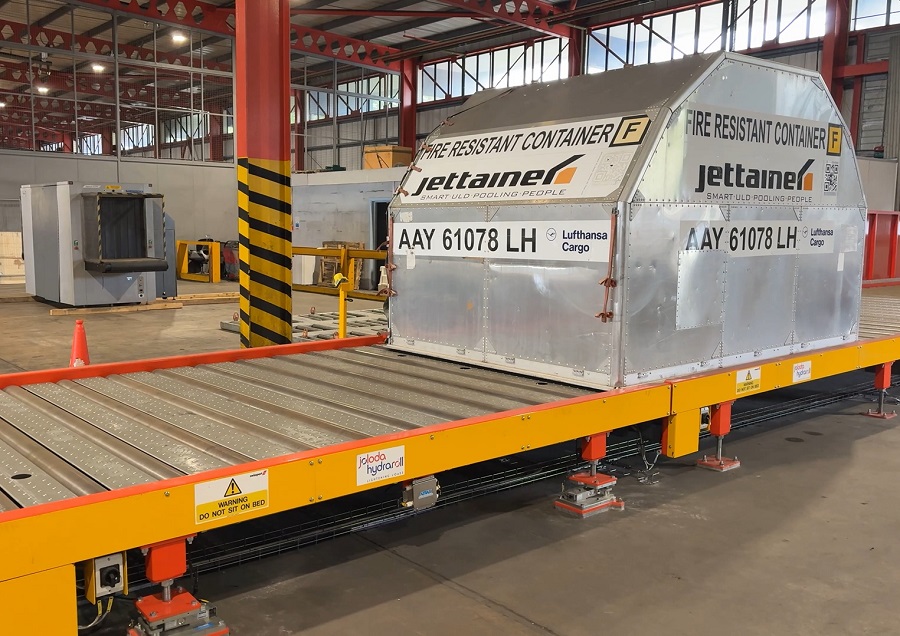At Birmingham Airport (BHX), Joloda Hydraroll has supplied major ground handling provider Swissport with a system to optimise its ULD handling process for freighter aircraft.
Swissport International Ltd is a global leader in ground and air cargo services, operating at approximately 300 airports across 45 countries. The company handles more than 5 million tons of air cargo annually across 117 facilities.
One of Swissport’s facilities is located at Birmingham Airport (BHX), where it operates air cargo services for a wide range of freight types, including e-commerce and time-critical shipments like pharmaceuticals and perishables.
The BHX site handles a mix of inbound and outbound cargo from dedicated freighters to provide a full suite of cargo services, including general and special cargo handling, temperature-controlled handling, hub handling, express services, and forwarder handling.
The Challenge
The site handles high volumes of cargo from dedicated air freighters, each capable of transporting up to 39 ULDs. The handling process was reliant on forklifts to move ULDs across the warehouse from truck docks to airside dollies.
With rising air cargo volumes, the challenge was how to handle inbound and outbound cargo – especially time-sensitive shipments – more efficiently. Particularly during peak overnight windows, it was essential to minimise aircraft turnaround times and ground time.
For outbound shipments, ULDs are built up in-house and must undergo several compliance procedures, including x-ray screening, weight verification, and detailed classification of both the goods and the containers they are transported in. These steps introduce additional handling requirements and increase operational complexity, making process efficiency even more critical.
There was also heavy dependence on manual processes and regular forklift use to transfer ULDs between the existing truck dock across the width of the warehouse and towards the air side dollies.
To improve turnaround speeds for freighter aircraft and increase daily throughput, the site required a flexible system that would integrate with existing infrastructure, automate key steps, and streamline compliance for export cargo, while reducing reliance on forklifts.
The Solution
Joloda Hydraroll installed a suite of modular air cargo handling equipment designed around the existing warehouse footprint to futureproof the site for growing cargo volumes. The system also needed to integrate with existing infrastructure, including a 20ft truck dock supplied by AirTech, with whom Joloda Hydraroll entered a strategic partnership in 2024.
Powered Roller Decks: Installed at the critical interface between the dock and the warehouse, the powered roller decks automate the movement of ULDs, significantly reducing manual handling. One of the powered decks was fitted with a certified integrated weighing scale, allowing cargo to be weighed in-line during handling. This eliminates the need to move ULDs to a separate weighing station, saving time and reducing unnecessary ULD movements.
Castor Deck Field: A new castor deck zone was created to allow 360° movement of ULDs, giving operators maximum flexibility for positioning and aligning loads. The castor deck was designed to simplify manual movement and staging in tight areas, especially useful in busy or constrained warehouse layouts. The number of castor deck positions was intentionally chosen to create a space where a larger number of ULDs can be quickly and temporarily stored, enabling faster unloading of freighter aircraft and improving turnaround efficiency. Within the castor deck area:
- Dolly Connection Zones enable smooth transfer of ULDs from airside dollies to the warehouse system, reducing handling steps and improving process flow.
- Walkways and Handrails were installed to provide designated safe access for staff, enhancing on-site safety and helping to enforce safe routes through operational areas.
- Safety Barriers act as physical separation between staff and moving ULDs, reducing the risk of contact injuries and supporting compliance with health and safety protocols.
Roller Decks: To link the castor deck to the powered roller lanes, standard roller decks were installed. These mobile workstations set at a height of 508mm and can be moved or removed easily with a forklift truck when not in use. This flexibility maximises operational warehouse space as needed. When in position, the roller decks create a Fastlane connection between the airside and landside, allowing ULDs to be moved with minimal force across the warehouse floor. This reduces physical strain on workers and speeds up the manual positioning of cargo units between systems.
Mobile Workstations: Specialised mobile units, designed to be picked up using forklift forks, were included to manoeuvre ULDs safely between handling zones. These mobile work stations reduce the risk of damage during movement by stabilising ULDs and avoiding direct contact with forks or other hard surfaces. The mobile workstations are also set at a low height of just 208mm, which makes it easier for operators to build up and break down cargo directly from ULDs, improving ergonomics and handling efficiency.
New Control Panel: A centralised control panel was supplied to operate the powered roller deck and dock equipment. Consolidating control into a single access point from a simplified remote supported and streamlined communication. Maintaining one program reduces the need to update multiple projects and ensures that software fixes propagate across the entire system. Technicians require training on only one PLC system, minimising complexity and errors, while spare parts management is simplified due to reduced variation. The centralised setup also allows for easier implementation of redundancy and backups, improving reliability.
Ongoing Maintenance Support: Joloda Conveyor Services provides post-installation technical support, with SLA-backed response times of 2 to 4 hours. Regular servicing ensures the system remains reliable and optimised, minimising operational downtime.
Together, this configuration enabled a one-directional cargo flow from dolly arrival to storage or outbound loading, with easy movement of cargo across the width of the warehouse and for loading into trailers.
Benefits of Implementation
Swissport’s local operations team at Birmingham Airport noted immediate operational improvements following the introduction of the new air cargo handling system, including:
- Increased cargo throughput due to faster ULD movement and in-line weighing.
- Improved turnaround speeds, especially during peak freighter arrivals.
- Enhanced safety with fewer forklifts in use and clearer warehouse walkways.
- Operational flexibility through modular layout and slave pallet mobility.
- Future-ready infrastructure, with the ability to scale the system over time.
The flow of cargo across the warehouse—from truck dock to storage or outbound trailers—was significantly improved, with fewer manual steps and reduced congestion.
Nav Heer, Cargo Operations Manager at Swissport, commented: “The system has noticeably changed how we manage daily operations, particularly by automating key stages of the ULD handling process. This has helped us improve aircraft turnaround times, especially during busy periods. The in-line weighing function has also addressed a previous bottleneck in our export flow, supporting better handling of time-sensitive cargo.
“There have also been changes in the working environment, with fewer forklifts in use and clearer walkways contributing to a more organised and potentially safer workspace. The installation process went smoothly, and the system now gives us a more scalable setup to manage growing volumes.”
Conclusion
By combining automation with safe, flexible cargo movement, the integrated air cargo handling system from Joloda Hydraroll is helping Swissport meet both current and future operational demands at Birmingham Airport. The installation has streamlined ULD movement and increased daily throughput – without compromising on safety or compliance.







